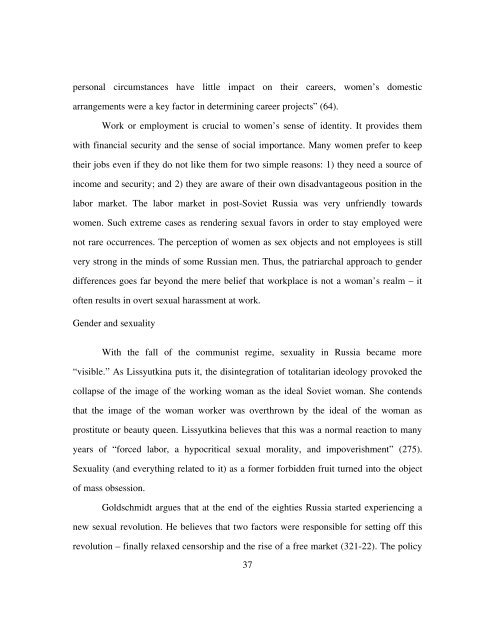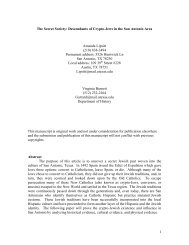Copyright by Tatiana Borisovna Segura 2008 - The University of ...
Copyright by Tatiana Borisovna Segura 2008 - The University of ...
Copyright by Tatiana Borisovna Segura 2008 - The University of ...
Create successful ePaper yourself
Turn your PDF publications into a flip-book with our unique Google optimized e-Paper software.
personal circumstances have little impact on their careers, women’s domestic<br />
arrangements were a key factor in determining career projects” (64).<br />
Work or employment is crucial to women’s sense <strong>of</strong> identity. It provides them<br />
with financial security and the sense <strong>of</strong> social importance. Many women prefer to keep<br />
their jobs even if they do not like them for two simple reasons: 1) they need a source <strong>of</strong><br />
income and security; and 2) they are aware <strong>of</strong> their own disadvantageous position in the<br />
labor market. <strong>The</strong> labor market in post-Soviet Russia was very unfriendly towards<br />
women. Such extreme cases as rendering sexual favors in order to stay employed were<br />
not rare occurrences. <strong>The</strong> perception <strong>of</strong> women as sex objects and not employees is still<br />
very strong in the minds <strong>of</strong> some Russian men. Thus, the patriarchal approach to gender<br />
differences goes far beyond the mere belief that workplace is not a woman’s realm – it<br />
<strong>of</strong>ten results in overt sexual harassment at work.<br />
Gender and sexuality<br />
With the fall <strong>of</strong> the communist regime, sexuality in Russia became more<br />
“visible.” As Lissyutkina puts it, the disintegration <strong>of</strong> totalitarian ideology provoked the<br />
collapse <strong>of</strong> the image <strong>of</strong> the working woman as the ideal Soviet woman. She contends<br />
that the image <strong>of</strong> the woman worker was overthrown <strong>by</strong> the ideal <strong>of</strong> the woman as<br />
prostitute or beauty queen. Lissyutkina believes that this was a normal reaction to many<br />
years <strong>of</strong> “forced labor, a hypocritical sexual morality, and impoverishment” (275).<br />
Sexuality (and everything related to it) as a former forbidden fruit turned into the object<br />
<strong>of</strong> mass obsession.<br />
Goldschmidt argues that at the end <strong>of</strong> the eighties Russia started experiencing a<br />
new sexual revolution. He believes that two factors were responsible for setting <strong>of</strong>f this<br />
revolution – finally relaxed censorship and the rise <strong>of</strong> a free market (321-22). <strong>The</strong> policy<br />
37

















